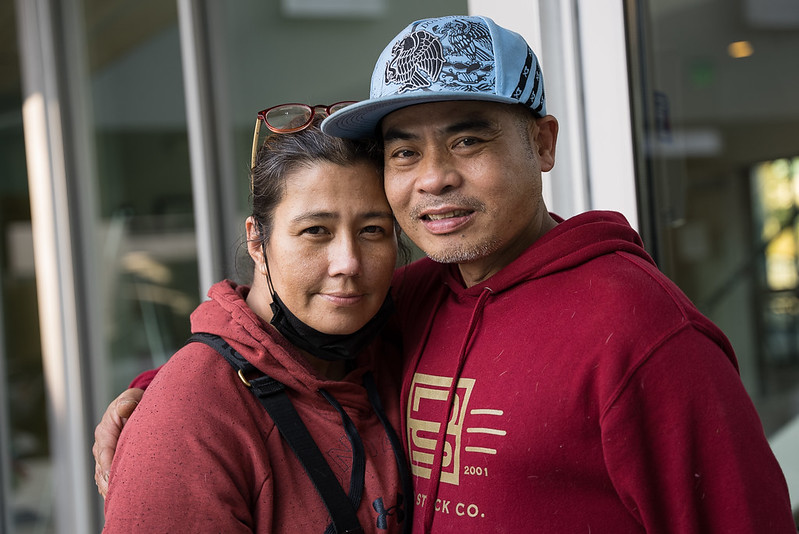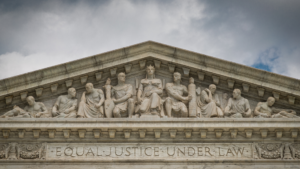After five years living outside, Marie, pictured above, is now in emergency housing and says she feels like a real person again.
Since the King County Regional Homelessness Authority (KCRHA) took over emergency homelessness response one year ago, we are making major progress. Here’s a look back at some of the highlights from 2022:
Moving People Inside
“We’re all human, we all have a story. We want better, we didn’t choose this.”
This year, more than 4,500 individuals, couples, youth, and families have moved into housing, including nearly 1,400 people who moved into housing thanks to new programs administered by the Authority together with partners.
Three new programs implemented by KCRHA are getting people into housing right away:
- Emergency Housing Vouchers. With the three local Public Housing Authorities, we developed an equity-driven voucher program, focused on people living unsheltered. To date, 1,270 individuals, couples, and families have already moved inside. King County’s near full utilization of this new federal resource is one of the best in the nation, and we expect the full allotment of 1,314 vouchers will be leased soon. Read more about this program here and here.
- Partnership for Zero. This public-private partnership set up a Housing Command Center with support from HUD to streamline the actions needed to house people So far, more than 30 individuals, couples, and families have already signed leases to move inside. You can help by sharing our landlord incentive package.
- State Right of Way Safety Initiative. With partners at PDA, REACH, WSDOT and the State Department of Commerce, we resolved five encampments on state highways, moving 118 out of 119 individuals inside, a better than 99% success rate. Read more about the encampment resolutions at Northgate and Dearborn, and see pictures of Gov. Inslee’s visit to an emergency housing building.
This work is only possible through partnership across service providers, housing providers, and all levels of government.
Centering Lived Experience
The Authority is legislatively required to be accountable to people with lived experience of homelessness—this community agreement, signed into law, is one of the key differences between KCRHA and previous efforts.
We are proud that our staff represents the people we serve, with 97 dedicated agency employees, 67% of whom are non-white, and a majority of whom have lived experience of homelessness or housing instability. Our work involves regular collaboration with the Lived Experience Coalition and with homeless service providers, many of whom also have lived experience.
In addition, as part of the Point In Time (PIT) Count, in Spring of 2022 we interviewed 670 people living unsheltered to learn about their personal stories, barriers, and solutions to inform our work. You can see additional data from the PIT Count, including racial disproportionalities and health care needs here.
To ensure that racial equity is embedded in all our work, we use an equity-based decision-making framework, improved the prioritization process in Coordinated Entry to be more equitable, and provide training opportunities for staff on Undoing Institutional Racism with the People’s Institute for Survival and Beyond.
Severe Weather Response
Climate change continues to impact the need for severe weather shelters, with extreme cold, snow, heat, and unhealthy air quality events becoming more frequent than ever before.
In 2022, we managed more than 50 days of severe weather response to provide people experiencing unsheltered homelessness with some protection from the elements.
Together with all 39 cities and multiple local service providers, we are improving coordination and response. We implemented a new three-tiered system for severe weather response, with increasing levels of activities at each tier, starting with making emergency supplies funding available to service providers, then moving on to opening extra capacity overnight shelters. The tiered system is an active document that is being worked on in partnership with Public Health, the National Weather Service, and the Office of Emergency Management. Harborview Medical Center is also testing the thresholds to understand the impact of living unsheltered in extreme weather conditions.
Since February, we have distributed over $185,000 in emergency funding for severe weather supplies to service providers like InterIm CDA, Mary’s Place, Friends of Youth, Lake City Partners, REACH, Chief Seattle Club, and LIHI.
To learn more, read a recap of the February 2022 cold weather response, and a recap of the July 2022 heat wave response. Since November, we have already activated cold weather response four times, providing supplies, opening extra capacity overnight shelters, and and convening daily coordinating calls with outreach, service providers, and partners across King County’s sub-regions.
We know that utilization goes up when people hear that a site will be open reliably for a few days, and that meals may be provided.
Over the course of two weeks in November-December, multiple sites expanded capacity to provide severe weather response, with significant utilization.
- Compass in Seattle has been serving between 40 and 56 people each night, and Fisher Pavilion has been serving between 41 and 76 people each night;
- Mary’s Place in Bellevue was at capacity with 91 extra spots full, Eastside Men’s Shelter was at or over extra capacity with 116 people;
- In Burien, Highline UMC was at or over capacity with between 46 and 63 people, and Sundown Shelter in Auburn was near capacity with between 61 and 78 people each night, including between 8 and 12 in cars for safe parking.
It’s important to remember that temporary severe weather shelters would be unnecessary if there was enough housing for everyone—housing is the solution to homelessness.
Please note that the RHA does not manage severe weather contracts outside of Seattle, and many cities use different activation thresholds. Going forward, we will continue to look for ways to improve seasonal severe weather response.
Partnership for Zero
Our public-private partnership to achieve functional zero in downtown Seattle and the Chinatown International District is well underway. The Housing Command Center is up and running daily, and at least 30 individuals, couples, and families have already signed leases. Read more in our November progress report.
Our team of 26 Systems Advocates are providing outreach, data collection, and support for people navigating towards services and housing.
“A lot of times folks hold their excitement in because they like to actually get the keys first,” shared KCRHA Lead Systems Advocate DaJenae Carter. “Once that happens, you really get to see the happiness that a person has when they know this is their place, they know, this is my room, this is my kitchen, this is my bathroom. It’s a great feeling.”
We still have lots of work to do, as the latest By Name List shows more than 830 people experiencing unsheltered homelessness in downtown.
Private landlords and housing providers can help by participating in our landlord incentive program, please email housing@kcrha.org to learn more.
Partnerships with Service Providers
In January 2022, the City of Seattle and King County handed over 320 contracts with service providers. We consolidated those contracts, strengthened oversight and performance monitoring, and distributed over $114 million of contracted funds to organizations like LIHI, Urban League, the YMCA, and Hopelink.
To ensure coordination and effective homelessness response, we depend on partnerships with service providers. To keep those relationships strong and ensure multiple opportunities for feedback, coordination and improvement, we organized 28 “base building” sessions with service providers, joined existing regional tables for providers such as the Eastside Homelessness Advisory Committee, South King County Forum on Homelessness, and the North Urban Human Services Alliance, created geographic huddles for outreach workers, held the first outreach symposium, facilitated a Vehicle Residency Workgroup, created a biweekly learning circle for shelter providers, and held convenings dedicated to Black and Native serving partners.
For new programs, we have held 25 community engagement sessions to help shape seven new Requests for Proposals (RFPs) that together award over $16 million to service provider partners. We’re also ensuring that smaller organizations, new organizations, and organizations that are by and for specific populations can pre-qualify for funding opportunities in an equitable way.
In November 2022, we released a new Regional Services Database that shows what homeless services are available across all the sub-regions of King County. This is the first time that information has been collected in one place, searchable by type of service and location, and available to the public.
Going forward, we will work with service providers to redesign and rebid the service system to ensure that we are having the greatest impact on reducing unsheltered homelessness.
Budgets Reflect Values
Budgets are fundamentally a reflection of a community’s values, and while levels of investment are affected by the broader economic climate, investment priorities demonstrate a commitment to specific goals and outcomes.
The Authority’s proposed budget focused on the specific goals and outcomes that would have the greatest positive impact for the most people. With gratitude to our partners at the City of Seattle, King County, and our state and federal governments, our final 2023 budget includes many of those priorities—wage increases for service providers, continuation of encampment resolutions on state property, safe parking, and increased outreach.
In addition, our partners in business and philanthropy are contributing funds to support Partnership for Zero, as well as efforts aimed at reducing youth homelessness.
To secure renewal of federal grants and the maximum potential in new federal funds, we held 12 community engagement sessions that informed our applications to the U.S. Department of Housing and Urban Development (HUD), for $70.6 million in federal funding.
We’re also excited to announce that four North King County city councils have voted unanimously to pool their funding and sign an agreement with the RHA to better coordinate homelessness response. The overwhelming support by these councils builds momentum for continued efforts to strengthen collaboration across the region.
While investment in homelessness emergency response and affordable housing is not yet sufficient to meet the need and solve the problem, the prioritization of these issues in federal, state, and local budgets shows that all levels of public and private partners are working together towards our shared goal of moving more people inside.
Looking Forward
As we head into 2023, we are finalizing our legislatively required Five Year Plan, which includes seven goals aimed at improving system performance and reducing unsheltered homelessness.
We look forward to sharing the plan with you in early 2023.
Photo courtesy of Governor Inslee, from his visit to an emergency housing building run by PDA (JustCARE/CoLEAD) in Seattle.


